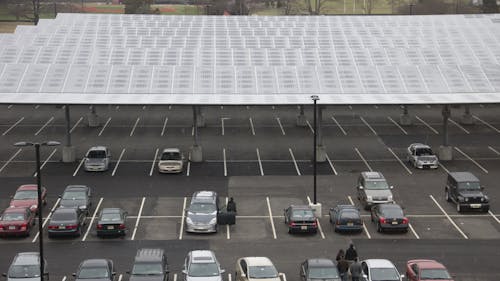Rutgers student government votes to support renewable energy campaign

In the face of uncertainty surrounding national environmental policy, last week the Rutgers University Student Assembly (RUSA) took a look at the future of renewable energy at Rutgers.
During RUSA’s full-body meeting on Nov. 30, the assembly passed legislation entitled, “Resolution to Support the 100 percent Renewable Campaign at Rutgers University,” which recommends that University President Robert L. Barchi commits "to achieving a goal of 100 percent clean, renewable energy no later than 2050," according to the legislation.
The legislation formally endorses and offers support to the New Jersey Public Interest Group (NJPIRG)’s 100 percent renewable energy campaign.
NJPIRG launched this campaign during the Spring 2017 semester, said Amy Wang, secretary and campaign coordinator of the Rutgers—New Brunswick chapter of NJPIRG.
The Rutgers Business School sophomore said, “The goal of our campaign is for President Barchi to make a statement committing Rutgers to 100 percent renewable energy by the year 2050."
NJPIRG has also written several reports published by their partner, Environment New Jersey, which can be viewed online, Wang said.
The first report, entitled "Renewable Energy 100," explains why colleges and universities can and should lead a push to renewable energy, Wang said. The second report, "Renewable Energy 101," describes specific strategies that schools can use to transition to renewable energy.
Currently, 4,000 students and more than 100 faculty members have signed endorsement letters in support of the campaign, Wang said. The Rutgers Engineering Governing Council has also passed its own resolution in support of the initiative.
Sponsored by the University Affairs Committee, RUSA’s resolution was presented by Dan Chulak, the University Affairs Committee chair and a School of Environmental and Biological Sciences senior.
Other presenters included Michelle Glauberzon, a Livingston at-large representative and Rutgers Business School first-year and Aneesh Deshpande, the Academic Affairs Committee chair and a School of Arts and Sciences sophomore.
Both of them served as authors of the legislation along with John Bacchus, the campus organizer from NJPIRG.
Chulak said the purpose of the resolution is to express support for the campaign, and to show the University administration that this is an issue students care about — noting that sustainability has been a priority of the assembly for many years.
“It’s 100 percent feasible for us to move toward 100 percent renewable energy sources, and we’ve been steadily reducing our nonrenewable energy sources since 2009,” Chulak said.
In addition to the resolution, the assembly also published a report outlining energy usage at Rutgers.
Between 2009 and 2016, Rutgers—New Brunswick campus reduced its carbon footprint by an estimated 444,509 metric tons of carbon dioxide equivalent (MTCO2e) — saving approximately $69,571,964 in operational expenses, according to the RUSA report.
Deshpande noted these victories during the presentation, including the plans implemented on the Busch and Livingston campuses, which have helped to reduce overall carbon dioxide levels. The University still has a long way to go in terms of achieving higher levels of energy conservation, he said.
“While these are steps in the right direction,” he said. “Some ideas that we’ve had ... are to implement things such as different satellite panels across buildings, and start working towards being even more conservative when it comes to energy.”
The RUSA report also included information about the Presidents' Climate Leadership Commitment, which is an environmental pact signed by presidents and chancellors of colleges and universities to reduce greenhouse gas emissions and achieve carbon neutrality.
There are currently 574 active signatories from higher education institutions, including four Big Ten Schools, according to the organization’s reporting platform. Rutgers University is not a signatory on this agreement.
Glauberzon said that last year the RUSA Sustainability Task Force wrote a report to encourage Barchi to sign the report.
“He did not (sign), but we still do encourage the leadership commitment to be signed,” she said.
Glauberzon said that Rutgers did sign the “We Are Still In” pledge in June 2017.
This is an agreement which supports the implementation of the Paris Climate Agreement on campuses in response to President Donald J. Trump’s withdrawal from the international agreement to decrease carbon dioxide emissions and the overall carbon footprint, according to an NJ Advance Media article.
Bacchus said that NJPIRG has not yet been able to schedule a meeting with Barchi, but would also like to pass a resolution through the University Senate — which is composed of faculty as well as students.
“(The RUSA resolution is) another step towards showing broader support to the decision makers at Rutgers and the University Senate that this is something that they should consider, and there are a multitude of reasons why,” Bacchus said.



